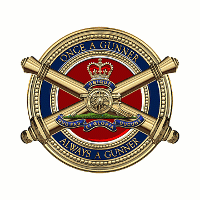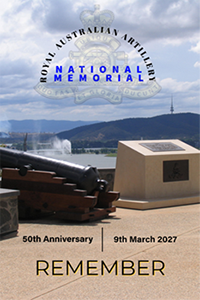William David (Dai) Thomas was born 18 January 1936 in Newport, Pembrokeshire, a small village in the far south-west of Wales. His parents were both professional actors and Dai chose a suitable dramatic entrance; it was apparently a dark and stormy night. Some of Dai’s earliest memories are of a German fighter strafing the Newport High Street, his Mother waking him up to witness the London blitz and the of bombing of Pembroke Docks. Is it any wonder that he became a gunner? His father duly enlisted and was initially sent to join the 8th Army in North Africa and later joined Bill Slim in Burma. Dai did not see his father until he returned at war’s end in 1946.
As was common at the time Dai was sent to boarding school when he was aged 9 and although from good Welsh chapel stock he went to a C of E establishment. He was always amazed how although he was very unusual for a Welshman being tone deaf with little appreciation for music he could always remember the hymns sung at daily prayers, particularly the substituted lyrics that all schoolboys are prone to. He always had a particularly soft spot for the hymn, ‘Tto be a Pilgrim’, especially the line: “no goblin or foul fiend shall daunt his spirit.” This sums up much of Dai’s general attitude to life as little seemed to daunt him.
Dai left school early as his thespian parents thought that he was destined to also grace the boards. However, he found working as Assistant Stage Manager for his father not really to his liking and, probably like many of us here today, decided that the best way to escape a family picked career was to join the Army. As he was only sixteen he had to join as a boy soldier. In the UK one does not join the Army as such, you join a Regiment. His choice of Regiment was the 24th of Foot, the South Wales Borderers. Being a Welsh regiment most men shared a limited number of names and to avoid confusion formal address was surname with last two figures of one’s regimental number hence Thomas 98. Naturally Thomas 99 and 97 were allocated bunks on either side of his in the barrack room. In a Welsh Regiment Christian names were just as much a problem and as all of the variations of William had already been taken so he became known as 'Dai' a very common Welsh diminutive of David.
The normal lot for Boy Soldiers was to be trained as either a drummer or bugle and fife player then, on reaching maturity, to join the regimental band. No doubt because of his lack of musical acumen and better education Dai was given a more general military training where his obvious talents were quickly recognised. Whilst still technically a boy soldier he was selected to be a weapons training instructor and promoted to corporal. He was then selected to attend Eaton Hall – the academy for short-service commissions. This was unusual enough but it did not end there, as while undergoing the course at Eaton Hall he was offered a cadetship for a regular commission and was sent to the Royal Military Academy Sandhurst. He was still under 18.
When the time came to select a regiment Dai found that there were no vacancies in the infantry so, because he was good at mathematics, he applied to, and was accepted into the Royal Artillery. Although he was now a gunner, he first saw active service when his regiment was deployed as infantry in Cyprus – hunting General Georgios Grivas and his EOKA (Cypriot fighter) terrorists.
After Cyprus he went with his Regiment to the British Army of the Rhine (BAOR) where his career followed a more normal path with appointments as GPO, and later Survey Officer. Service life in BAOR offered plenty of diversions and Dai made the most of the opportunities presented by rugby, boxing, and sailing. He climbed with Chris Bonington, (Sir Christian John Storey Bonington, CVO, CBE, DL) later of Everest fame, and skied for the Regiment's cross country team. In fact he seemed to spend more time playing, sailing and skiing than soldiering. Despite what sounds like an overly full life he found the time to court and then marry Josie – a teacher with them British Families Education Service in 1960. This was the start of a love affair that lasted some 40 years.
Dai applied for a secondment to the newly raised Arab Infantry Brigade in Aden. Much to his dismay he found that he had to undertake an infantry platoon commander’s course. Naturally, being non-infantry he suffered the usual fate:
Have we a Gunner in the team?”
“Yes?”
“Good. You carry the Bren.”
After Arabic language training he was posted as Intelligence Officer and then Adjutant of the 1st Battalion in Aden. The ‘Levies’ were deployed on internal security duties throughout the Protectorate particularly in the Radfan Mountains just north of Aden. He was joined in Aden by Josie and Elizabeth.
His desert interlude was followed by another stint in BAOR where he served as GPO of a gun troop, then as troop commander in the first UK’s Mortar Locating Battery. Dai also managed to be the RA Sailing officer which was a full time job based in Hamburg, and managed to winter in Austria with the RA’s skiing team. Peacetime soldiering with the Brits could be hell sometimes. He returned to 40 Field Regiment in time to spend a twelve month stint in the jungles of Borneo during confrontation. Much of this time was spent as a Forward Observation Officer with a Ghurkha battalion.
Dai returned to the UK to learn that the British Army was again being reduced. The PM’s declaration that no longer would British troops be deployed east of Suez was not a promising outlook for an artilleryman with a young family to feed.
Dai left the army and attended Exeter University's where he qualified as a teacher. But like a few others either still serving, or recently separated from the British Army, he noted that there were opportunities in the antipodes where Australia was expanding its military to meet an ever growing commitment in Vietnam. When he was in Borneo, the Royal Australian Artillery had helped train his battery in jungle warfare and Dai was impressed by what he saw. He applied to the Australian Army and a short time later accompanied by Josie and three daughters – began a career in the Royal Australian Artillery.
He was first posted as Battery Captain 131 Divisional Locating Battery but he volunteered for service with the Australian Army Training Team. He served in Vietnam 1970-1971 as Psychological Operations Advisor in Phuoc Tuy Province. In 1972 he was posted as Second in Command of 4th Field Regiment in Townsville. He considered his two outstanding achievements there was the design of the wrought iron gates into the mess bar area which are something to behold, and getting rebellious subalterns to accept that thongs were only worn by gentlemen of the artillery in the showers. This was followed by a stint as a staff officer in 1 Task Force. Dai was selected to attend both the Australian Army Staff College and the Joint Services Staff College before a posting to Ops Branch in Army Office.
He continued sailing whenever he could, managing six Sydney to Hobart races. I remember meeting him in Hobart when he had completed a race as cook on the Army crewed Anaconda II. I asked him what he fed the crew. With a twinkle in his eye he said on the first night he served up roast pork crackling, roast potatoes and all the trimmings to find out who had the stomach for sailing.
Dai left the army in 1986 and established a one-man graphic design and desktop publishing business – Daigraphics - which he described as a moderate success. One notable publication was the development of the 'Eros' magazine a monthly magazine for the sex industry. This grew from an A3 fold news sheet to a newspaper to the glossy magazine. I remember Josie’s reaction to being invited to a cocktail party to launch the first of the series of the glossy magazines held at one of the houses of ill repute in Mitchell. However, she went and later admitted that she rather enjoyed meeting the people involved. Eventually the advances in technology made it impossible for Daigraphics to remain competitive but Dai continued to produce illustrations and cartoons for customers in Australia and overseas. During this period Dai also undertook an MLitt in history at the ANU where his thesis was on the history of sponsorship and professionalism of the Sydney Hobart yacht race.
His love of history got him into another venture undertaking historical research on behalf of Milsearch. He had so much enjoyment ferreting through old maps, commanders’ diaries, obscure reports and the like to find out what happened where and whether there was any lingering danger from unexploded ordinance.
The love of his life, Josie, died in October 2006. He spent a totally appropriate period of mourning and to help him at this difficult time several people suggested getting a dog as a companion. He was considering this and thinking of a terrier but I knew of a young Labrador with attitude who was looking for a good home. I convinced him that if you are seen on a park bench having a deep and meaningful conversation with a terrier people will think you mad, but with a Labrador everyone will understand. He agreed to go to Bemboka and have a look at the dog. One look and they were both hooked, they became inseparable. They had great fun together undertaking obedience and gundog training and competitions. Dai also volunteered as a instructor at Belconnen Dog Obedience Club.
Close friends may remember long lunches on the lawns of University House becoming increasingly profound as the wine flowed. In the later years he reverted to his infantry origins and with his hiking stick undertook challenging walks including up Bunyip Gorge in the Northern Flinders Ranges. A friend remembers a rugby match at Staff College when a member of a visiting team apologised to Dai for accidentally kicking him in the head, Dai assured most emphatically don’t worry “those other bastards did it”.
Those of his comrades who knew and loved him held him in great admiration on a number of accounts. He was never judgemental: he would always sit and listen quietly to those who held opinions, ruminate and then gently restore logic to the argument. For a gunner he had a wealth of cultural and literary knowledge – anyone trying to escape with a half baked theory or argument would be gently drawn back to reality. He had a very sharp intellect that came from a wide knowledge and very considerable experience. Dai was a man whose views mattered and whose ideas were important. Dai was the quintessential free thinker: tolerant, questioning and prepared to gently stand up to, or ignore, the intolerant. He had a wonderful free spirit, contempt of convention and pomposity and a strong belief in the right to free speech.
Dai was a man who operated on many strata. There was great depth to him: in his knowledge, his experience and his philosophy of life. There was also Dai’s lighter side: an impish Welsh sense of mischief, a readiness to laugh and an ever present sense of whimsy.
He was a great and wonderful man. |






